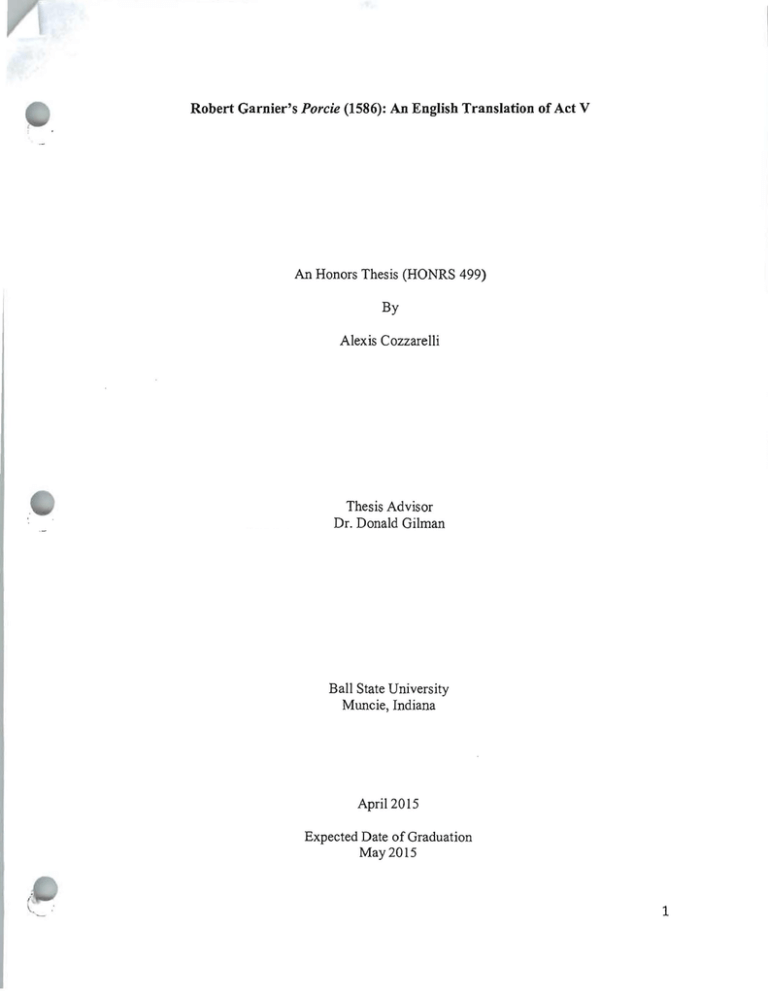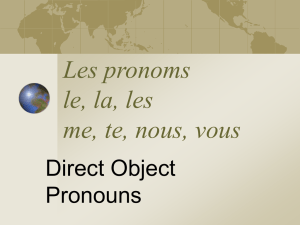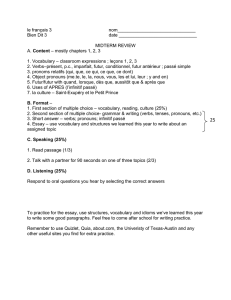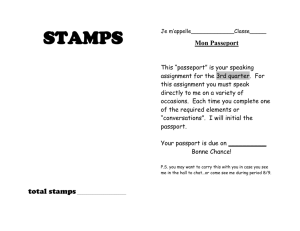Document 10995589
advertisement

Robert Garnier's Porcie (1586): An English Translation of Act V An Honors Thesis (HONRS 499) By Alexis Cozzarelli Thesis Advisor Dr. Donald Gilman Ball State University Muncie, Indiana April 2015 Expected Date of Graduation May2015 1 d Acknowledgements , -.-'1 I would like to thank my thesis advisor, Dr. Gilman, and Kathryn Smith. Without the diligence of these two individuals, I would not have been able to complete this project. They worked countless hours double checking my work to make it as perfect as possible. Abstract This project is the translation of Act V of Robert Garnier's Porcie (1586). Robert Garnier's tragedy Porcie (1586) reflects the tastes and temperament of sixteenth century French drama. There is an introduction at the beginning of the thesis to bring the reader up to progress with the play, as this thesis only includes Act V. It includes both the French lines, in their original fonnat, as well as an accompanying English translation. This act is the final piece ofthe French tragedy Porcie, and thus concludes the story. It involves the characters ofthe Nurse and the Chorus of Roman Women. Table of Contents Introduction ........................................................................................... 3 Works Cited .........................................................................................7 Translation of Act V of Robert Garnier's Porcie: Tragedie .....................................................................................................8 2 Introduction Robert Garnier was perhaps the most prominent sixteenth-century French dramatist. Strongly influenced by the development of Sebean tragedy, he wrote a tragedy Porcie that followed a strict fonn, popular in Ancient Rome. It is a tragedy with a series of rhetoric narratives followed by a lyric chorus. Robert Gamier's tragedy Porcie (1586) reflects the tastes and temperament of sixteenth century French drama. Historically, not much is known about Porcie Catonis. Born between 73 BCE and 64 BCE in Rome, she was the daughter of Marcus Porcius Cato Uticencis and his wife Atilia. She was married flrst to Marcus Calpurnius Bibulus, who was a political ally to her father. Bibulus adored his wife, to the point of refusing to allow his political allies to have children with her. Such an arraignment was not uncommon in ancient Rome. During this time, Caesar's Gallic Wars was coming to a conclusion, though he refused to lay down his anns and return to Rome to face the Senate. Instead, he marched upon Rome with his anny who had sworn allegiance to him and not to the Roman state, though it was custom. Both Porcie's father and husband, Bibulus sided with Pompey, who along with Julius Caesar and Crassus, was a member ofthe First Triumphant, because he did not hold the same threat politically that Caesar did for the family. When Bibulus died in 48 BCE, Porcie was left as a widow. Porcie's father committed suicide in 45 BCE following his defeat in battle. Following the death of her husband and father, Porcie married Brutus. To gain Brutus' trust, Porcie slashed herself in the thigh with a dagger. She suffered for at least a day to prove she could endure the pain. Bedridden with chills, fever, and violent pains, 3 she returned to Brutus with the resolve for there to be no secrets between them. Brutus confided in her his plot to assassinate Caesar, knowing she would be able to stand torture if it came to that. Some credit her as being the only woman aware of the plot. With the assassination of Caesar successful, Brutus and his co-conspirators fled to Athens. Porcie stayed in Italy, though it pained her to be departed from her husband. Porcie's death is something of a debate among historians. The first problem is knowing exactly when Porcie died. Some say that it was after the first battle of Philippi, when she heard rumors that Brutus had died. The other possibility is that she committed suicide following the actual death of her husband after the second battle of Philippi. There is also debate as to the way she died. One theory is that Porcie committed suicide by swallowed burning coals. However, another more popular theory is that Porcie committed suicide by burning coal in an unventilated room and thus succumbed to carbon monoxide poisoning. Gamier employs this historical basis as the narrative frame of the tragedy. The plot of the play revolves around Porcie. It starts by telling the legends of Rome, particularly those surrounding the god Mars. This is not surprising since much of Porcie's life revolved around war, death, and destruction as noted by the biography about her previously written. The tragedy begins with the aftermath of Caesar's assassination. Due to being separated from her husband, Brutus, Porcie laments about how she desires to follow her father into the grave. The Second Triumvirate, that consists of Octavian, Marc Antony, and Lepidus, attempts to gain power as well as punish those who played a part in the death of Caesar. Brutus is killed in battle, and a messenger delivers the news 4 to Porcie. She does not take it well and takes her own life. The tragedy terminates with the death of the Nurse. Act V's importance to the play, the translation of which forms this thesis, revolves around the characterization of the Nurse as well as a retelling of the offstage drama that occurs between acts. The Nurse serves as the primary character during Act V. She talks about the extraordinary circumstances surrounding Porcie's death, "Prend des charbons ardans, et, d 'un regard farouche/Guignant deya. del a, les enferme en sa bouche: /Les devale au gosier, puis se venant serrer/Et la bouche et Ie nez de peur de respirer,lS'estouffa de ses mains [She takes burning coals, and, with a savage glance,lLooking all around, here and there, encloses them in her mouth:/The throws them into throat, then gradually shut Both her mouth and nose for fear of breathing,lShe suffocated herself with her hands]." This imagery takes the deceive action that Porcie was driven to suicide by the death of her husband. To go into such detail of Porcie's death shows the importance of the Nurse as a character. She is to tell the audience about the events that have taken place off stage and between acts. The Nurse also serves the purpose as a distinct character herself. She is loyal to Porcie, even following her into death after detailing her mistress' suicide. She is the only character to die on stage, lamenting her incoming death: "Mourons, sus sus mourons, sus, poignard, haste toy,lSus, jusques au pommeau vien t'enfoncer en moy. [Lets us die, arise, arise, let us die, arise, dagger, hasten,lArise, up to the very pummel that is going to be thrust into and implanted in me.]" This description of the Nurse gives an ending to the tragedy, both with the account of her mistress' death but also of her own. 5 At first, the translation was as very difficult. Sixteenth-century French required a degree of knowledge that I did not possess. Instead of accent marks, there would be additional letters, making it difficult to tell if something was word that I simply did not know, or if it was a word I knew but not with that orthography. The other difficulty was finding the correct terminology to convey the sentiment of a word. While there would be a direct translation, the phrasing and ultimate word choice gives the tragedy the feeling of doom that it is supposed to have. The act itself was fairly easy to understand. There were few references to historical subjects that I did not understand, thanks to my majors in history and French. This made it easier to translate, since I knew the basic background of what happened in Rome following the assassination of Caesar. In preparing this translation, I relied upon the critical edition by Temaux. Overall, I think the tragedy is framed in such a way that it is easy to read. It conveys the correct sentiments that create a generous description for the reader. Though Act V was the shortest in the play, it provides the perfect conclusion to the piece. It was a pleasure to translate it with the help of Dr. Gilman and Kathryn Smith. Without the help of these hvo remarkable individuals, the act would not have reached its potent quality. 6 Works Cited Cotgrave, Randle. "A Dictionarie of the French and English Tongues." Cotgrave's 1611 French/English Dictionary. N.p., n.d. Web. Spring 2015. <http://www.pbm.com/~lindahl/cotgrave/>. "Discover the Story of English More than 600,000 Words, over a Thousand Years." Home: Oxford English Dictionary. Oxford University Press, 2013. Web. Spring 2015. <http://www.oed.com/>. Garnier, Robert and Ternaux, J. "Acte V." Porcie, Tragedie. Paris: Cahmpion. Print. 7 Acte V ActV La Nourrice. Le Chceur de Romaines The Nurse. The Chorus of Roman Women. La Nourrice The Nurse Accourez Citoyens, accourez, hastez-vous, Come quickly, Citizens, come quickly, hurry, Romulides amis, helas, secourez nous, Friends of Romulus and his heirs, alas, rescue us. Quiritez accourez, ceste race divine, Hasten, Citizens, this divine race, Brute meurt doublement. Brutus dies again. La Chceur de Romaines The Chorus of Roman Women Las! quel malheur nouvveau Alas! What new misfortune Peut encor' desastrer de Brute Ie tombeau ? can still reign disaster upon Brutus's tomb? Quel estrange accident, quelle horrible infortune What harsh distress, what dreadful misfortune Depuis son dernier sort de rechefl' importune ? Since again his last ill-fated destiny Allons 0 troupe aimee, allons voir quel mechef Come, 0 beloved group, come see what ruin Ceste pauvre maison atterre de rechef : This poor house again leaves aghast: Allons, filies, allons. Let us depart, daughters, let us depart. La Nourrice The Nurse o vieillesse chetive ! 0 wretched old age! o femme miserable! 0 o malheur ! 0 fortune nuisive ! malheur ! 0 forlorn woman! 0 harmful circumstances! 0 woe ! 0 woe ! 8 La Chceur de Romaines The Choms of Roman Women Quel malheur advenu What misfortune that has befallen us Te fait ainsi plomber ton estomach chenu ? Causes you thus to beat your aged breast? La Nourrice The Nurse o que ne suis-je morte ! 0 que ne sui-je en o that I am not dead ! 0 that I am not buried in terre! the ground! o qu' un sombre tombeau maintenant ne o that a dark tomb does not now embrace me ! m ' enserre o woe! 0 o malheur ! 0 woe! malheur ! La Chceur de Romaines The Chorus of Roman Women Laisse ces cris piteaux, Leave behind these doleful cries, Et ne tien nostre esprit plus longuement And no longer keep our mind in further douteux. suspense. 9 La Nourrice The Nurse Ces cheveux ja grisons, ces tettes nourricieres, This hair already gray, these nourishing Et ces tremblantes mains, qui te faisoyent breasts, pneres, And these trembling hands, which enact my N'ont peu donc t'amolir l ? n'ont peu doncques prayers for you, n'ont peu Could they not have appeased you? Could they Destourner ce desir que tu avois conceu ? not have Que fera desormais ta fidele Nourrice ? Turned away this desire that you had Que fera-t'elle, helas ! sinon qu ' elle perisse ? conceived? Ab, mon cher nourri90n, ne cognissois-tu pas Henceforth what will your faithful Nurse do? Que ta mort avec soy tireroit mon trespas ? Alas, what will she do! Except to perish Ne cognoissois-tu pas, gemissable Porcie , Ab, my dear new born child, did you not know Que je ne puis sans toy longuement estre en That your death would bring along with it my vie? passing away as well ? Et qu'au milieu des maux que triste tu avois, Did you not know, oh lamenting Porcie, Ce qui me faisoit vivre, estoit que tu vivois ? I cannot continue to live long without you? Tu estois lors rna vie, et tu es a ceste heure Celle qui par ta mort est cause que je meure. And in the midest of the ills that you sadly lived, Which have enabled me to live, what were you living for? You were at the time my life, and you are at this moment the one who, Your death is the reason of my death. 1 amollir 10 o malheur ! 0 malheur ! 0 woe ! 0 woe ! Le Chreur de Romaines The Chorus of Roman Women Jamais pauvre Cite, Ever fortunate City, Ne trouveras-tu fin it ta calamite ? Do you not find an end to your calamity? Las tousjours mal sur mal, miseres sur miseres Always evil upon evil, misery upon misery Te feront renommer aux terres estrangeres ? You be the server of your fame in foreign lands? Les meurtres en tes flancs sejourneront Murders in your flanks will always remain , tousjours, While your fate will stay its course? Tandis que ton destin entretiendra son coms ? La Nourrice The Nurse Plorez vostre Cite, mes fideles compagnes, Weep for your city, my faithful companions, Qui porte ores, qui porte au front de sept Which now brings, to the foot of seven mountains, montages, As many afflictions and various torments, Autant d'afflictions et de tourmens divers, That she fearfully bore throughout this entire QU'elle porto it de crainte it tout cest Univers. Universe. Plorez filles plorez, et dites : adieu Romme, Weep, daughters, weep, and say: Goodbye Rome, Qu'un renomme malheur pour tout jamais A famed misfortune ever spread fame for all. renomme. 11 Le Chreur de Romaines The Chorus of Roman Women Les pleurs n'ont point tary dans nos lannoyans Tears have not dried in our weeping eyes yeux Since the trifold agreement of our seditious three 2, Depuis Ie triple accord de nos trois factieux, Who, in order to put at their feet our first freedoms, Qui pour mettre a leurs pieds nos franchises Have divided among themselves legions of premieres, warrIOrs: Departirent entre eux les legions guerrieres : Since then the sword has never moved from their Des lors jamais Ie fer n'a bouge de nos mains, hands Non contre un estranger, mais contre nous Not against a foreigner, but against us Romans. Romains. The Tiber which was accustomed to exult its banks Le Tybre qui souloit enorgueillir ses rives With its arrognant display of captive spoils, Du superbe appareil des despouilles captives, That our valiant princes drew from every pal1 of Que nos Princes vaillans tiroyent de toutes our world pars, No longer fills its waves except with our Ne charge plus ses flots que de nos estendars. warring banners. 2 Julius Caesar, Pompeii, Crassus 12 La NOUlTice Or' il est temps d'ouvrir la porte The Nurse a ta tristesse, Now is time to open the gate to your sadness, II est temps de mourir, langoureuse vieillesse, Now is time to die, languishing old age, Vieillesse longoureuse, helas ! qU'attens-tu Languishing old age, alas! Do you expect plus anything more Que tu ne te vas rendre en un tombeau reclus? Than to render yourself to a solitary tomb ? Sus, voicy Ie poignard, que ta Maistresse aimee Arise! Here is the dagger that your beloved Print pour homicider sa poi trine entamee, mistress Tu l' ostas de ses mains, cuidant par tel effort Took to bring death to her violated breast, Luy avoir bien oste la cause de sa mort. You seized it from her hands believing such an Mais ce fut vainement : car par une autre sorte effort Elle estouffa son creur dans sa poi trine morte : To have indeed robbed her of the cause of death. T'enseignant Ie moyen d'esteindre tes But this was in vain: for through another douleurs, means Et tes cuisans regrets autrement que par pleurs. She suffocated her heart in her dead breast. Sus donc mon estomach, engoule ceste lame, Teaching her the way to extinguish your pain, A fin de te rejoindre aux ombres de ta Dame. And your brooding regrets rather than through your tears. Arise! Thus thrust this blade into my inner being In order to be united with the shades of your Lady. 13 Le Chreur de Romaines The Chorus of Roman Women Raconte nous sa mort, Nourrice, et dy Recount to us her death, Nurse, and how comment In spite of everything she could swiftly die. Elle a peu maugre tous mourir si vistement. What could this daggard tell us ? And why so Que monstre ce poignard ? et pourquoy si suddenly soudaine While abusing you, do you wish to hasten your Veux-tu en t'outrageant haster ta mort approaching death? prochaine ? La Nourrice The Nurse Opere Jupiter! o father Jupiter! La Chreur de Romaines The Chorus of Roman Women Et qU 'est-ce que tu crains, And what do you fear, Et qU 'est-ce qui te fait destordre ainsi les And what causes you to wring your hands ? mains? Alas, for so many winters have pitiless Las, depuis tant d'hyvers les Immortels severes Immortels Ne nous ont-ils assez endurcis aux miseres ? Not harden us sufficiently against misery? Y-a-til malencontre, y-a-til mal aucun, Is there any misfortune, is there any evil, Y-a-til accident qui ne nous soit commun ? Is there any mishap that may not be common to Conte nous hardiment, nous sommes preparees us ? Tell us forthrightly and plainly, we are prepared from now on 14 A n'ouir desorrnais que choses malheurees : Reprens un peu Ie c~ur. Only hear woeful things: Take courage. La Nourrice The Nurse Je sens mon mal s'aigrir I feel my heart becoming bitter D'autant que je m'efforce a vous Ie descouvrir. As much as I strive to open up to you. Le Ch~ur de Romaines « La douleur s'amoindrit quand elle est The Chorus of Roman Women Pain is lessened when it is confessed. racontee. La Nourrice The Nurse « La douleur qu'on decouvre est beaucoup The pain that is uncovered is very much augmentee. increased. Le Cha!ur de Romaines The Chorus of Roman Women « Raconter ses ennuis n'est que les exhaler. Recounting his troubles only vents them. La Nourrice The Nurse « Raconter ses ennuis, c' est les renouveler. Recounting his troubles makes them: Le Cha!ur de Romaines The Chorus of Roman Women Conte les toutesfois. Confess them nonetheless. 15 La Nourrice The Nurse Quand rna pauvre maitresse When my poor mistress Eut entendu que Brute, avec que la noblesse Had heard that Brutus, with his nobility, Qui combatoit pour luy d'un si louable cueur, That fought for him with such praiseworthy Avoit este desfaict, et qu' Antoine vainqueur courage, Luy renvoyoit son corps, qu'it grand' Had been killed and that Antony the sollicitude vanquisher II avoit recherche parmi la multitude: Was returning to her his body, that with great Apres force regrets qu'elle fit sur sa mort, concern Apres qu'elle eut long temps plon~ son triste He had sought among the masses: sort, After she burst open her regrets that she made Retiree en sa chambre, entreprit, demy-morte, on his death De borner ses langueurs par quelque briefve After she had for a long time wept over his sad sorte : fate, Elle eut recours au fer pour s'en player Ie sein, Withdrawn into her room, after she undertook Mais nous qui l'advisant, accourusmes half-dead, soudain, To limit her sorrows by some swift means: Luy ostames des mains et tout ce dont la rage, She resorted to the sword to wound her breast, But we who counseling her, suddenly ran to her, Seized her hands and everything that was enragmg, 16 Beante apres sa mort luy pouvoit faire outrage. Gaping after his death could cause her to resort Mais ce fut bien en vain: car cognoissant que to extremes. nous But that was in vain: for knowing we La voulions destourner de suivre son espous, Wanted to turn her away from following her Nous monstra par effect, que celIe qui decrete husband La mort en son esprit, n' en peut estre distraite. Showed us indeed, that one who decrees Elle pensa songearde et repensa pour lors Death in mind and spirit cannot be turned away Comment elle pourroit desanimer son corps: from it. Puis ayant a par soy sa mort determinee, In her dreams she thought and thought deeply Languissante s' assied pres de la cheminee, How she could deaden her body: Et ne voyant personne a l' entour du fouyer, Then having determined her death by herself, Qui semblast, soupc;:onneux, la vouloir espier, She sits down, languishing at the fireplace, Prend des charbons ardans, et, d'un regard And seeing no one around the hearth, farouche Who appeared, suspiciously, wanting to spy Guignant dec;:a dela, les enferme en sa bouche: upon her, Les devale au gosier, puis se venant serrer She takes burning coals, and, with a savage Et la bouche et Ie nez de peur de respirer, glance, Looking all around, here and there, encloses them in her mouth : She throws them into her throat, then gradually Shutting both her mouth and nose for fear of breathing, 17 S' estouffa de ses mains, et tombant renversee, She suffocated herself with her hands, and Nous fit bien presumer qU'elle fut trespassee. falling over, Nous accourons au bruit, et chacune de nous, Caused us indeed to persume she had passed S'arrachant les cheveux, se martelant de coups, away. Eleve un cry semblable a celuy qu'en Phrygie We run to the commotion, and each of us, Les Corybantes font celebrant leur Orgie, Tearing out our hair, beating ourselves with Lors que Ie mont Ida resonne des grands cris blows Emits a cry similar to Qu'ils hurlent par troupeaux, troublez de leurs The Corybantes, in Phyrgia, who celebrate esprits. Ou semblable their Orgies, a celuy des matrones Troyennes, When Mount Ida resounds with great cries Lors que Ie feu rampoit aux tours That they, spiritually disturbed, howl Dardaniennes, throughout their troop. Que leurs temples ardoyent, et que leurs Or like the cry of Trojan Mothers ennemlS When fire crept up the Dardanian towers Esgorgeoyent, desloyaux, leurs espous When their temples were burning, endormis. And when their disloyal enemies were slitting Or nous la redressons, et plus mourantes the throats of their sleeping husbands. qu'elle, Now we recover from this, Toutes nous I'accusons, nous I'appellons And more dying than she, we all blame her. cruelle, All of us blame her, we call her cruel, Nous luy tirons des dents quelques charbons de We pull from her teeth firey coals, feu, We feel the breast which was slightly Nous lui tastons Ie sein qui sanglotoit un peu : trembling 18 Une palle froideur luy glac;:oit Ie visage, A pale coldness glazed over her face, Qui de sa prompte mort nous donnoit That gave us testimony of her swift death: tesmoignage : Then with a sigh she exhaled, Puis, avec un soupir qu'elle poussa dehors, She expelled her life and soul from her body. Elle poussa la vie et l'ame de son corps. Chceur Chorus o triste langueur ! o sad sad grief! o malheur qui nous suit! o woe which follows us! o peuple vainqueur, o victorious people, Las, te voila destruit ! Alas, here you are finished ! Que Ie jour qui luit May the day that shines Dessus ceste Cite, Over this City, Voile so us la nui t Veil under the night Sa luisante clairte. Its shiny brightness. Que Ie Ciel voute May the vaulted sky Des Dieux pleins de COUITOUS Of the Gods filled with wrath, Son foudre appreste Its lightning at hand Bouleverse sur nous. Shatters us. Les Tygres et Lous, Tigers and Wolves, Cruels hostes des bois, Cruel denizes of the woods, Se monstrent plus dous Appear a hundred times milder . Que les honunes cent fois. than men. 19 La Nourrice The Nurse Chantonsd'une vois Let us sing with one voice Brute nostre support, Of Brutus our sustaining force, Brute que nos Rois Of Brutus whom our Kings Ont conduit ala mort. Have led to his death. Chceur The Choir Or' que tu es mort, Since you have died, Las, helas ! nous mourons, Alas, alas! we die, N ous plorons ton sort, We weep over your fate , Brute, nous te plorons ! Brutus, we weep for you! Las! nous demeurons Alas! we live Comme Ie tronc d'un corps, As the torso of a body, Dont l'ame est dehors, From which the soul has escaped, Brute, nous te plorons ! Brutus, we weep for you! Tant que nous vivrons, As long as we live, Nous vivrons en esmoy, We will live in distress Demeurant sans toy, Living without you, Brute, nous te plorons ! Brutus, we weep for you! Puisque nous irons Since we go Sous la main des vainqueurs, Under the hand of the conquerers, Pleines de langueurs, Filled with sighs, Brute, nous te plorons ! Brutus, we weep for you! 20 La Nourrice The Nurse C'est assez pour luy, That is enough about him, Nostre Brute est contant, Our Brutus is at rest, Faites qu' aujourd'huy Have Porcie have Porcie en ait autant. Enough of this today. Chceur Chorus Reyoy nos douleurs, Receive our sorrows, Et nos soupirs aigrets : And our sighs Enten nos regrets, Hear our regrets Porcie, enten nos pleurs. Porcie, hear our tears. Enten les langueurs, Hear our sighs, Qui troublent nos esprits: That trouble our spirits: Las ! enten nos cris, Alas! hear our cries, Porcie, enten nos pleurs. Porcie, hear our laments. Regarde aux malheurs Look at the woes Que pourtraits sur nos fronts That are portraits on our foreheads Pour toy nous souffrons, We suffer for you, Porcie, enten nos pleurs. Porcie, hear our laments. Qu'un printemps de fleurs Maya springtime of flowers N aisse dessus tes os, Be born upon your bones, Enten nos sanglots, Hear our sobs, Porcie, enten nos pleurs. Porcie, hear our laments. 21 La N ourrice The Nurse Mes filles, c'est assez, vos complaintes plorees My daughters, that is enough, your doleful Ont bien suffisamment leurs Ombres honorees. laments Las, ne les plorez plus, ils sont mieux fOliune Have indeed sufficiently honored their Shades. Que no us qui demeurons dans nos corps Alas, not longer shed your tears; they know a obstinez. better fOliune Us ne ressentent point la fureur des trois That we who remain in our unflinching bodies. hommes, They do not feel the fury of the three men, Ils ne cognoissent rien du servage ou nous They know nothing of servitude that we sommes : experience where we are: lis vivent en repos, affranchis des langueurs They live in peace, freed from the suffering Qu'ils eussent endure sous ces Tyrans They had endured under these vanquishing vamcueurs. Tyrants. Plorez, filles plorez pour vos propres miseres, Weep, my daughters weep for your own Qui retiendrez icy vos ames prisonnieres, mlsenes, Plorez vostre malheur, plorez, helas ! plorez Which will keep your imprisoned souls here, Les infinis tourrnens que vous endurerez. Weep for your misfortune weep, alas! weep Quant a moy, qui suivray les pas de rna The infinite torments that you will endure. Maistresse, As for myself, who will follow in the footsteps Je n'ay pas de besoin de plorer rna vieillesse. of my Mistress, Ce poignard que je tiens, ce poignard que I do not need to weep in myoid age. voicy, This dagger that I hold, this dagger that you see here, 22 M'enferrant I'estomach m 'ostera ce soucy. Piercing my stomach will release me from this Mais que tarde-je tant ? qU 'attende-je musarde, care. Qu'ores je ne deromps rna poitrine vieillarde ? But what delays me so much? In this Quelle frayeur m'assaut ? queUe glaceuse peur dreamlike state what am I waiting for? Pirolietant en moy me vient geler Ie cceur ? That now I do not tear apart my aged breast? C'est en vain, c'est en vain, rna mort est What terror assults me? How frozen fear arrestee, Whirling within me comes to stiffen my heart Et desja mon esprit voit I'onde Acherontee. with cold? Mourons, sus sus mourons, sus, poignard, haste It is in vain, it is in vain, my death is decreed, toy, And already my spirit sees the wave of Sus, jusques au pommeau vien t' enfoncer en Acheron. moy. Lets us die, arise, arise, let us die, arise, dagger, hasten, Arise, up to the very pummel that is going to be thrust into and implanted in me. 23





